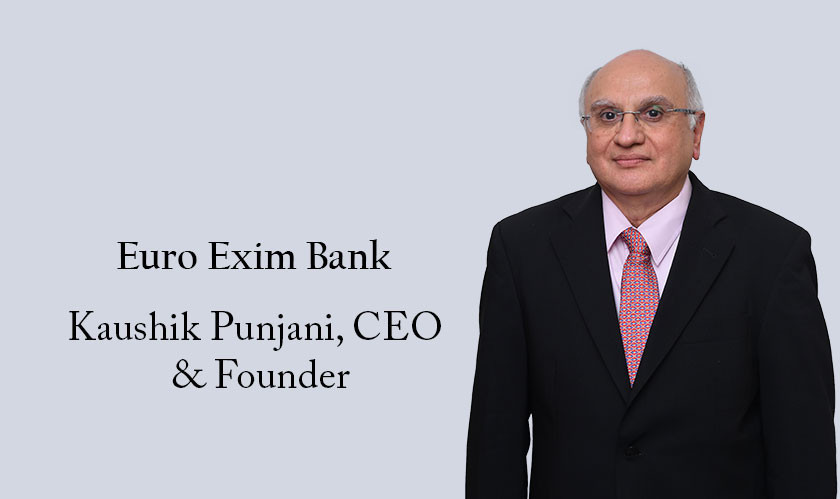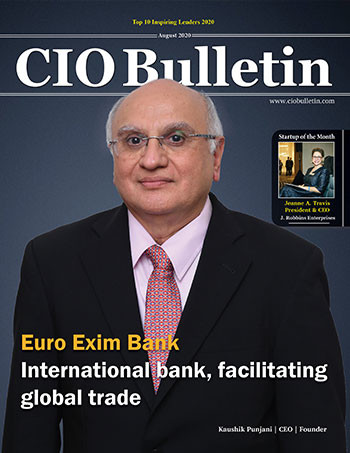Top 10 Inspiring Leaders to watch 2020
CIO Bulletin

We are already occupied with so many traditional banks. The centralized banks have always been the safest and most reliable option. But after the Bitcoin boom in 2017, we can sense that the future of banking is going to change, the currencies will be more global and more widely acceptable. The future of the economy lies on the blockchain, either centralized or decentralized.We have seen several big companies like Facebook, investing in cryptocurrencies.
There are a few banks that have anticipated the role of blockchain in the future of banking. It is not only a reliable medium but also economical. One such bank is the Euro Exim Bank that started its operations as a small payments institution but later evolved into a full-fledged bank. We had a word with the CEO of Euro Exim Bank, Kaushik Punjaniwho gave us a lot of insights about the bank.
Q. Tell us about the origins of your company. How successful has it been over the years?
Euro Exim Bank was founded in 2015, from a Small Payments Institution involved in payments remittances.With falling margins and high operational costs in this sector, the company soon realized that competing in a crowded market was not a long term sustainable approach. In 2017, it incepted its Headquarters in St Lucia, in the West Indies with a Class ‘A’ banking license under the supervision, authorization, and regulation of the Financial Services Regulatory Authority. They also established a Representative Office in London and a network of affiliates, agents, and partners in key locations, serving import and export businesses around the globe, facilitating trade finance.
Euro Exim Bank made a conscious decision to specialize in trade documents, specifically to assist companies in their quest for trusted instruments to facilitate global trade by mobilizing several trade operations for importers, facilitating their documentation, and reducing their paperwork to the bare minimum. Euro Exim bank has grown from 3 people to a global team of over 200 people, across 23 countries.
Q. What challenges did you encounter initially? How did you correct the flaws?
Initial challenges were the proliferation of paper, integrated workflow systems handling diverse documents reflecting the variety of goods and sanctions, the increasing role of compliance and legal in due diligence, the burden of AML, KYC sanctions and PEP checking, clean data capture, and full understanding of the complex trade ecosystem with all its players, processes, timings and expectations.
We also see greater market and supply chain complexity, lack of trust, and shortage of liquidity, especially in emerging markets.Our stance is not so much about correcting flaws, as looking at smarter ways to handle the onslaught of these requirements and external interventions.Our success has always been founded in flexibility, accepting what you cannot change, and working to make the best out of complex situations and demands.
We have found solutions to most issues, through partnerships and extending contracts to local agents, collaborating with Ripple for real-time payments and liquidity, extending specialized IT resources, and using blockchain and AI as integral parts of our applications, compliance, and legal programs. This leaves us well-positioned to tackle change and minimize the effects and demands from ever-present external forces, fighting cybercrime, understanding, and reacting to ever-changing new regulation and governance and compliance.
Q. Describe the process of Anti-Money Laundering (AML) and Know Your Customer (KYC) process.
The process of AML checking also covers KYC, where it is vital that institutions not only know their client but also need to check that they do not move any illegally obtained cash into the financial system so it looks like it was earned legitimately.
To prevent money laundering, a full customer due diligence, including sanction and Politically Exposed Person (PEP) screening is done. This information must be recorded internally and kept up to date so that you can reassess your business risk if a customer’s circumstances change, making it important to provide details to regulators for audit purposes and also mitigate risk in case of fraudulent activity resulting in legal action.Sanctions searches and PEP screenings are a central component of all AML checks, as they confirm that your client doesn’t present a money laundering risk.
Regarding KYC, the know your customer or know your client guidelines in financial services requires that professionals make an effort to verify the identity, suitability, and risks involved with maintaining a business relationship.
These procedures are mandated by regulators, and the procedures fit within the broader scope of a bank's Anti-Money Laundering policy. Collectively the entire industry is now involved in some way with AML processes to mitigate risk and ensure that their clients are not involved with corruption, bribery, or money laundering.
Q. How is your team competent enough/ trained to detect, deter, and check if EEB is misused?
We hold regular training, not only in trade and sales issues but equipping our staff to be better armed and ready to report any inconsistencies in data, spotting unusual information requests, quickly identifying external forces attempting to represent themselves as EEB, or attacking our reputation.
This is an ongoing process as cybercriminals and ill-meaning parties attempt to defraud, demean, steal clients, copy websites, and try to gain an advantage by any means in this challenging time.
We are confident that we are informed, positioned, and ready to handle any situations that may arise and protect our firm and reputation accordingly.
Q. What role does the Letter of Credit and Standby Letter of Credit play in Trade Finance Instruments?
A letter of credit is a guarantee from a bank that a particular seller will receive a payment due to a particular buyer. The bank guarantees that the seller will receive a specified amount of money within a specified time. In return for guaranteeing the payment, the bank will require that strict terms are met.
It will want to receive certain documents - for example, shipping confirmation - as proof. Letters of credit are most commonly used when a buyer in one country purchases goods from a seller in another country.
A standby letter of credit is like a standard letter of credit except that it is retained as a “standby” and isn’t usually the intended payment mechanism. Standby letters of credit are intended to provide a method of payment in the event the buyer fails to honor the terms of the contract or defaults payment.
Q. What are your provisions under Corporate Banking?
EEB Corporate banking, supplied online without retail branches specifically for SME corporates, provides the following services:
Navigating a safe passage through the myriad of players can be challenging for new market entrants, so companies need assistance with simplified processes and guaranteed payment corridors.
Q. Explain to us the working of Exim WAVE.
EXIM Wave is our latest addition to the product family, the Merchant account facility, a smart way to make and receive payments from customers across the globe.Open and hassle-free payment processing options support, mobile and web access, allowing users to sell online through e-commerce platforms, and provide POS devices at store locations.Support is available for debit and credit cards, bank accounts, bank transfers, M-Pesa, Visa QR, and USSD where users can set up and manage virtual cards, create virtual Mastercard and VISA, support new FinTech businesses with just a few lines of code, support team cards to manage to spend or even handle cloud-based server payments.
Q. Give us details of the contribution Euro Exim Foundation has done so far
At Euro Exim Bank corporate social responsibility has always been about taking philanthropic initiatives to make a difference. Our smart CSR strategy 2020 is established in recognition of the sense of duty weperceive towards our customers, employees, specialist agents, partners, suppliers, regulators, media, communities, and the environment.
Q. What is your participation in Corporate Social Responsibilities?
Our CSR policy is key, from charity fund-raising events raising thousands of pounds supporting hospitals and the underprivileged to local sponsorship of cultural events both at home, the Caribbean, and in Africa, our organization is pleased to provide regular support and awareness to those less fortunate than ourselves.
Euro Exim Bank aims to reduce carbon emissions. As an international bank with a growing global footprint, its management actively demonstrates its commitment to good causes and making a difference for underprivileged, disabled, and disadvantaged communities across the globe and the environment.
Q. Where do you see the future of EEB?
Even with the effects of Covid-19, we see a continuity of trade and in line with Governments and financial institutions alike, predict that trade will revert to pre-COVID levels in 2022, with continued growth thereafter.
We are now active in 23 countries, and our global plan is to cover more jurisdictions, more cities, and a greater range of products and services, positioning ourselves as the pre-eminent international facilitator of trade instruments, through the pandemic and offering sustainable services thereafter.
Q. Have you any plans for expanding the company?
Yes indeed, our management has well-established plans and has already seen a dramatic increase in the number of agents and partners employed by the bank.
As major banks retract and consolidate, we have been able to procure a significant number of experienced trade staff, and our ambition remains to be the largest sales team in the trade finance of any financial institution by the end of 2020.
Founder/CEO background
Kaushik Punjani, originally with a degree in Chemistry, moved into accountancy, manufacturing, global product distribution, and ultimately into the financial industry, as director and beneficial owner of Euro Exim Bank.
His experience covers on-line payments systems, confirmations, reconciliation, and his roles have covered management and delivery of financial solutions at the UK and international businesses at all levels. He is a regular conference attendee and is also a leading fundraiser for international charities, running concerts raising awareness and funds for projects in St. Lucia, Zimbabwe, India, and the UK.
Digital-marketing
Artificial-intelligence
Lifestyle-and-fashion
Food-and-beverage
Travel-and-hospitality